Well. That might be the funniest and most heart-rending hour and half of television I’ve ever watched.
Seriously, I think I’m going to cry. But that is what happens at weddings, right?
Spoilers for “The Sign of Three.” Comments may also include spoilers for the rest of the season.
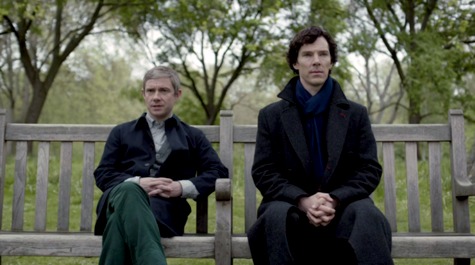
To attempt to make this all work out in a short recap, I’ll try to be as linear as possible. Sherlock helps John and Mary plan their wedding, but starts getting nervous because Mrs. Hudson is insistent that marriage will change everything. This seems less than likely as Mary and Sherlock are conning John into going on cases by making John think that he and Mary are conning Sherlock into going out on cases. It is the sweetest thing.
The case they go out on features a young guard at the palace who thinks he’s being stalked by someone who keeps taking pictures of him. He’s played by Alfie Enoch, who was Dean Thomas in the Potter films. Dean Thomas is found stabbed in impossible circumstances, and presumed dead until John realizes that he’s still breathing. Sherlock has no idea how he was hit—case unsolved.
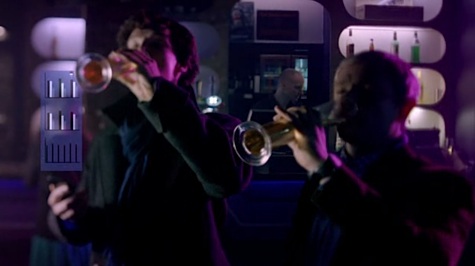
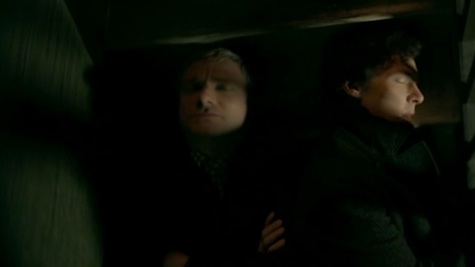
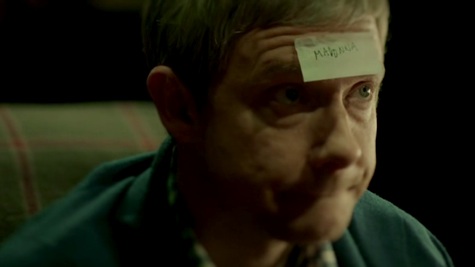
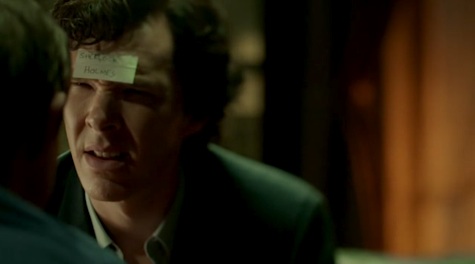
The next case crops up during John’s stag night, which is just John and Sherlock and oh my god, that’s amazing, why did they decide that it would be a good idea for just the two of them to go out, John, do you have any real friends? Sherlock has the whole thing down to a literal science (that he worked out with Molly’s help, bless), which is awfully sweet of him until John ruins it by slipping them both shots with their beer. They get comically wasted (GO HOME, SHERLOCK, YOU’RE DRUNK), play the twenty-questions game to staggering results, then get a client but fall asleep in the middle of her story. She wakes them to explain that she had an affair with a ghost, and they go to said ghost’s flat. Then Sherlock wanders around in a drunken haze and vomits on the ghost’s carpet. John and Sherlock wake up in lockdown and are bailed out by Lestrade.
Stay classy, Greg. Oh so classy.
John and Mary’s wedding arrives. It would seem that Sherlock screened all of their guests and had talks with anyone who might become a problem (such as an ex-boyfriend of Mary’s and the ring bearer). He makes his best man speech, which starts out a mess and rapidly becomes the most moving declaration of love and well wishes that a friend could give, which is more impressive because he’s Sherlock Holmes and not good at any of those things. He tells the guests about those former cases, all the while praising John for saving lives and being the person who keeps him on track. John hugs him, which Mary was supposed to keep him from doing, but she knows better because she’s perfect.
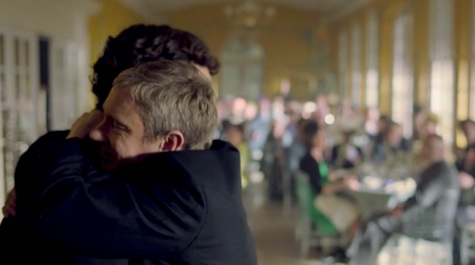
Then Sherlock realizes that a murder is going to take place at the wedding.
So he waylays his best man speech while he makes his deductions among the crowd and finds that John’s old army commander is the target. (He got a troop of young men killed years back and receives regular death threats.) Sherlock then realizes that all their cases have been connected; the “ghost” was dating women in the commander’s employ to find out where he would be, then rehearsed his murder on the poor guard. He’s the wedding photographer. His mode of murder was stabbing through the uniform, something that the victims didn’t notice until they removed their belts and began to bleed out. (Not sure if that actually works, but who cares?) John’s ex-commander goes into his room and decides that he will die there, but Sherlock talks him out of it—they would never do that to John Watson on his wedding day.
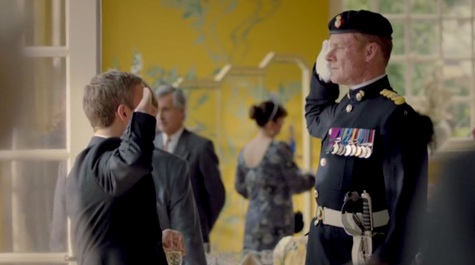
The detective plays his self-composed wedding waltz for the happy couple, then makes a very important vow to protect the both of them. Or rather, the three of them. He reveals to the couple that Mary is pregnant. While everyone dances the night away, he walks off into the night.
We continue to see Sherlock loosen up emotionally, and the ways in which that makes him more vulnerable than he used to be. He forms a fast friendship with Mary’s Maid of Honor—he becomes her wingman, even reveals to her that he loves dancing and happens to know a bit too much about ballet (please tell me he took lessons as a wee one)—but after he sets her up and finds himself abandoned on the dance floor, he quickly excuses himself from the reception. It’s heartbreaking to watch him make the effort and still find himself the odd man out, but it’s also realistic for any person who finds themselves awkward and outcast in the company of strangers.
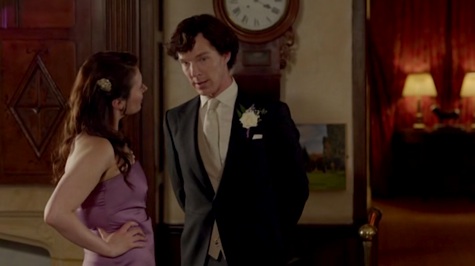
We get an even firmer grasp of John and Sherlock as the unbeatable duo, the ways in which they have still yet to show just how much they matter to each other. We find out that Sherlock is not the first abrupt, difficult man John has tied himself to; his old commander is what we might call Consulting Detective Version 1.0. It’s that similarity that allows Sherlock to get through to him when Major Sholto is thinking of letting himself die—they’re both honorable men who love John Watson.
On the detective’s end, his place in this refitted life is even more foggy. Sherlock’s more protective of John than ever, as we can see from his careful consideration about every aspect of the wedding; Sherlock of prior seasons would have never made himself available to this task at all. His confusion in trying to figure out who John’s best friend (and best man) might be is hilarious—he drinks tea with an eye in it!—but also depressing as all get out. For him to know that the man wanted him back from the dead, to hear that declaration in the bomb-rigged tube car during “The Empty Hearse,” and still not know that he is the most important person in John’s life next to Mary speaks volumes about just how off-base his understanding of human relationships still is.
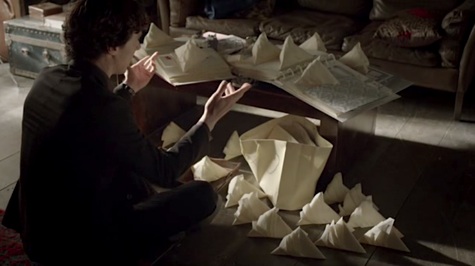
Sherlock has so far to go—so thank goodness Mary Morstan is there now to help him. Because damn, if this woman has not immediately figured out exactly who both of these men are, exactly how the three of them fit together, and what each of them needs individually to be happy. She is the one who knows that Sherlock can solve the case at their wedding because its emotionally immediate—something no one has managed to articulate to him before. And the moment that Sherlock tries to shut her down out of fear, John calls him out on his bullshit and he pulls it together. Hell yeah, Team Baker Street!
Really, this episode is such a whirlwind, and I can’t complain about a thing. It’s full of love and hilarity and drunken adventures. I am probably going to watch it another eighty times before I can let it go.
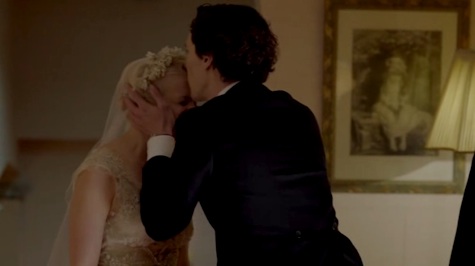
Things to talk about that would make this review too long, so I’ll just shout out to them:
- We saw Sally Donovan! And she seems totally fine and still on her game. Which is great, but can we ever find out exactly what made her hate Sherlock so much in the first place? Because there still seems to be unexplained stuff going down there.
- WHERE ARE MY ENDLESS GIFS OF MYCROFT ON A TREADMILL?
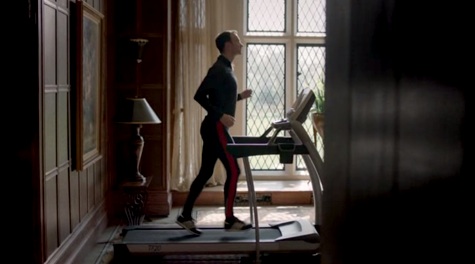
- Mycroft tells his little brother to remember Redbeard—are we meant to guess that this was Sherlock’s name when he was small and wanted to be a pirate? Because too cute, send help, forgot how to breathe….
- We finally find out what the deal was with Mrs. Hudson’s husband. Wow. Mrs. Hudson, you are so hardcore. You will still be at Baker Street long after everyone has gone because you are indestructible. (And you have the greatest hat.)
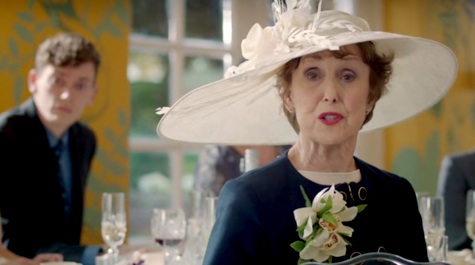
- Harry Watson, where are you? I will never be happy until we meet you. It’s important.
- Sherlock organizes things in a head-theater. Of course he does. It makes the Mind Palace look like a tiny spanner in the middle of a vast toolkit.
- Mary can tell when Sherlock is lying. Mary, you have to stop being so wonderful. Stop.
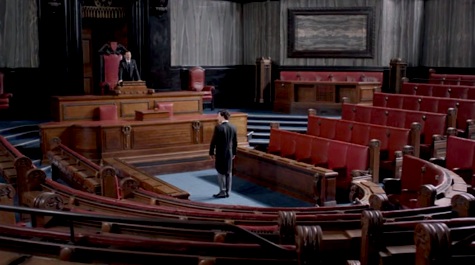
- Sherlock has a head-Mycroft. YES. This makes all the sense. We’re getting the impression more and more that Mycroft is responsible for training Sherlock’s brain the way we see it now. (Oh my god, their childhood. The more we get a sense of it, the more awed/terrible I feel.) So when Sherlock can’t quite reach answers, the Mycroft in his head pushes him in the right direction. This is probably the real reason why he thinks of him as “his arch enemy”—his big brother is always the part of his mind that crops up when he’s out of his depth.
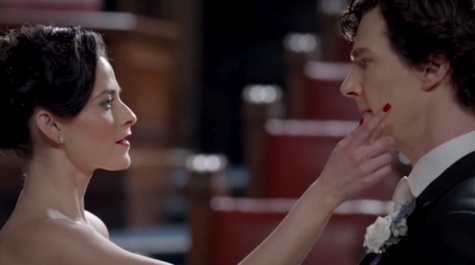
- Sherlock has a head-Irene. Who distracts him when he is trying to work. *giggles*
- That explicit dialogue reference to “The Sign of Four” where Sherlock tells John that he “cannot congratulate” him on his marriage, which is exactly what Holmes said in the canon. Such a lovely tip of hat, along with the upturned meaning of The Sign of Three for this tale.
- Other favorite canon reference—the cigarettes in the persian slipper instead of tobacco. At least we know he’s not sashing the more serious stuff there.
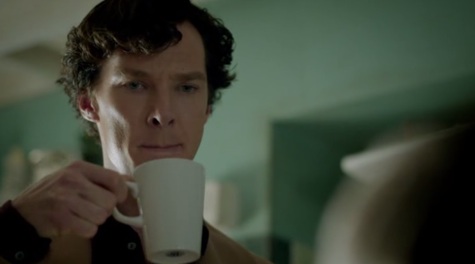
- Poor Molly. Her embarrassment over Tom’s stumble is just precious; it doesn’t look like her Sherlock replacement is working, despite her assurances. And I would like her to make Sherlock uncomfortable by talking about sex all the time.
- Ugh, it was just pointed out to me that Mrs. Hudson tells Sherlock that story early on about her Maid of Honor saying that her marriage to Mr. Hudson marked the “end of an era” and how the woman left early during her wedding reception, which is EXACTLY WHAT SHERLOCK DID. And now I’ll never be cheerful again.
And now to things that worry me: While it’s sweet that John and Mary are expecting, this set off my warning bells for the new Mrs. Watson. First off, it’s rare that shows deal with the everyday minutiae that’s involved in baby-raising unless that’s part of the point of the show. We know from Sherlock’s deductions that Mary is a liar about something, and we also know that whoever was threatening John’s life in the last episode directed their attack at her; she was the one who received the scary texts, not Sherlock. In addition, Mary Morstan was not with John Watson forever in the canon; we know that he buries her, though Doyle never explained the nature of her death. We also know that the title of the next episode is “His Last Vow,” likely relating to the vow that Sherlock just made at the wedding to be there for the Watsons at all costs. Moffat has also promised that the cliffhanger for this season is going to be more of a doozy than what we suffered in 2012.
UPDATE: In additon, one of the wedding telegrams came from someone named CAM. So Charles Augustus Magnusson, likely. It’s the telegram where Mary’s called “poppet” and the sender says “Wish you family could have seen this.” You assume Mary’s face falls at mention of her family… but it’s probably not that. Not even close.
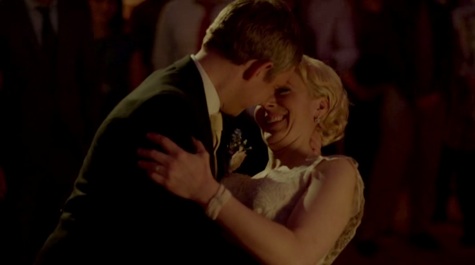
Which makes me very concerned that Mary’s life might be in jeopardy. And the tiny Watson as well.
Ugh, I don’t know that I can make it to next week. Help?
Emmet Asher-Perrin lived her whole life for the moment when John Watson asked Sherlock Holmes if he was a pretty lady. You can bug her on Twitter and read more of her work here and elsewhere.










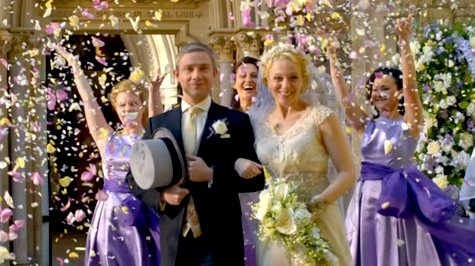
Now this was a much better episode than the previous one. Thank goodness for a less-arseholish Sherlock
Fantastic. The chemistry between the actors/characters, the hilarity, the heartdissolving love between Sherlock/John/Mary, the stag night: everything was perfect. And they even managed to include an interesting plot which directly connected with john! and Mycroft working out! And checking his pouch! Simply great.
But now I´m tremendously worried about Mary. If they´re keeping up with canon, an so far they´ve pretty much have… Hmmm.
And the name of the finale is “His Last Vow”. Hmmm.
Please, Moffat/Gattis: don´t crush our souls. Just don´t.
This was one of the best, if not the best moments, of Television that I have ever seen. The emotional rollercoaster of the Wedding speech took my breath away. I literally had to pause and compose my self at least twice before proceeding. The acting is SUPERB. SUPERB. This show is MILES ahead of anthing else on the small screen and the Big screen. And the “Pretty Woman” quote made me squee…
I have no idea how they will handle Mary. Obviously in canon she dies, but it really has no impact on Watson. He’s basically a bachelor doctor who drops whatever he is doing (patients, wife) when Sherlock has a case. I don’t think that can possibly happen in 2014, so if (when) Mary goes, it’s going to be tragic and have the same long-term impact on Watson’s psyche that the loss of a loved one would have on anyone. Would they really set us up for that roller coaster in 1 season (which BTW is a ridiculous concept for us Yanks…after 800 minutes of story telling, an american series is barely getting it’s sea legs.) Yes, it’s tought to be a crime solving doctor with dirty diapers and 3 naps a day. Hmm, I wonder if Mary will lose the baby but not herself die. Surely the story can accomodate a 3-person team!
They can’t kill Mary. No no no no no no no no. No. I FORBID IT. IT IS FORBIDDEN.
Except all signs point to it. Season 3 has thus far been a victory lap for Sherlock and Watson. They’re reunited, Moriarty is gone, they’re solving cases with relative ease, and just all around having a great time. Along with the hints Emily’s pointed out, in an overall dramatic sense we’re being lulled into accepting this as the new status quo, and it will be utterly devastating when that quo is broken.
Next Sunday is really, really, really going to hurt, isn’t it?
I just couldn’t take this episode seriously after Sherlock referred to the Guard as a Grenadier when he was quite clearly a Welsh Guard. Even though Sherlock hadn’t seen him in uniform and so couldn’t know for certain, he should have known there was only a 1 in 5 chance of his being a Grenadier if he was an infantryman in the Household Division. That and all the cringe moments… really made the episode quite painful to watch.
Mary and Sherlock are conning John into going on cases by making John think that he and Mary are conning Sherlock into going out on cases
That’s not how I read that scene. I saw Mary conning John and Sherlock into going on cases by making John think that he and Mary are conning Sherlock into going out on cases and Sherlock think that he and Mary are conning John into going out on cases.
@7 that’s how I figured it, too – that it was Mary’s doing, because she knew they both needed it.
Maybe they’re going to pull off a save, after lulling us into believing she’s dead because of ACD canon? hopefully? Because Mary is the best and I need her to stay and it’ll be HORRIBLE to both John and Sherlock at this point to lose her.
Which reminds me, I had the impression Mycroft’s “Redbeard” referred to some sort of ‘goldfish’ that Sherlock had as a child and lost – either a playmate/friend or an animal pet or maybe even a stuffed animal, or something like that. It was in the context of warning Sherlock about getting too attached. (omg their poor parents)
It was a fun and touching episode, which definitely also serves to make those paying attention a little bit more nervous…
@ReactorChris
Next Sunday is really, really, really going to hurt, isn’t it?
Oh yes, yes it is.
I’m though AA was already signed up for Series 4…?
There’s a preview up on youtube for his last vow. My link to it was eaten by some filter, so I’ll just post this:
http://www.youtube.com/watch?v=xhjIsu7n6bI
I had the same reading of the case as #7 – Mary encouraging both John and Sherlock to persue a case in order to help the other, because she knew persuing the case would help both of them.
Which I really, really liked.
The obvious and easy way to deal with Mary would be to make her a rival with Sherlock. She’s jeleous because she can’t compete with Sherlock intellectually, Sherlock is jeleous because he can’t compete with Mary emotionally. This gets resolved by killing Mary off, and doing so in a way that pushes John back to Sherlock, such as Sherlock solving the case.
The way it is now, they could, with ease, turn their crime-solving duo into a crime-solving trio. Mary holds her own, and does things that neither Sherlock or John can do (particularly keeping both of them honest), and it just works. In terms of storytelling, a detective trio would be something innovative, a change from the usual detective partners.
The baby complicates this. Someone would have to babysit. It throws an innocent into the picture. who upsets the balance of John/Mary/Sherlock in terms of meeting each others needs. (And thank goodness they didn’t try to make Mary into an innocent who would upset the John/Sherlock balance.)
Why do they do so short sesons??
An improvement on last week’s somewhat self-indulgent episode, or so I reckon. Greatly enjoyed this one though it apparantly is loathed by some of the fandom. A poll in the Guardian has 35% saying the series has jumped the shark (as of 1100 hours GMT) and a lot of hate on the Guardian website review. A bit mystified why.
Do we have to have another cliffhanger?
acacao@13
Funding. The average BBC series runs for 6 to maybe 10 45 minute episodes, normally just six. Dr Who is an exception with its 12-13. At 90 minutes long, each Sherlock can be seen as two episodes. Also, availability of the actors which, especially with Cumberbatch, is, I would imagine, increasingly problematic.
Oh, and if you can find it, I strongly recommend the radio sitcom Cabin Pressure which stars Cumberbatch and which he has rather brilliantly stayed loyal to as his success rises. It’s sometimes available on the BBC iplayer.
Why do they do so short sesons??
Because there’s only so many of us here in Britain paying our BBC licence fee so that you lot can watch it for free.
I don’t know that this should be considered “heartbreaking.” As someone who is extraordinarily introverted, this struck me as a very good way of dealing with a social occasion that requires interacting with a larger crowed. (Being extremely introverted, “large crowd” is defined as more than five.)
Sherlock gave himself specific tasks and goals for the occasion. This gave him much needed structure, so he knew how to behave. He first gave himself the task of making sure the wedding was pulled off successfully. Then he took on the task of solving the would-be murder, once his subconcious figured out that it was there to be solved. And he took on the task of helping the maid of honor find an appropriate companion for the evening.
Once his tasks were over, and he’d met his social obligations for the evening, he left.
This shows considerable self-awareness of his own social limits.
It also shows a remarkable willingness to make an effort to take care of himself.
Again, speaking as someone who is extremely introverted, it can be difficult to choose to back off in a social situation when it becomes overwhelming. There is a crowd of strangers and you’re supposed to be having fun, but there are far too many people too close for fun to be possible.
But Sherlock does this. And he does this in a way that is carefully measured to respect the limits of his social teaspoons while still doing and being everything that John needed from a best man.
This event is a success for Sherlock. He met all of his obligations as best man. He met all of his self-assigned responsiblities for making the day work for John and Mary. He solved a murder and saved a life. He made a few very real human connections, in a way that is meaningful for him (his rapport with the maid of honor.) He enjoyed himself, and then left before the social occasion developed from enjoyable to overwhelming.
The sad thing is not that Sherlock left when he did. Rather, what is sad is that his successful effort to make the event enjoyable for himself, physically safe for all the other guests, and emotionally safe for John and Mary, is seen as a failure rather than a triumph.
Isn’t Sherlock’s mind palace where Parliament meets? I was sure it was, but no one seems to be mentioning that so maybe I’m wrong.
In related news, Emily, I love your columns. I always look for your name and read them even if they aren’t for anything I’m particularly interested in. Good writing makes any thing interesting and you are good. I can’t easily find a place on here to send a note to authors, so just going to leave this here.
ProfMel@17: Isn’t Sherlock’s mind palace where Parliament meets?
If you mean the House of Commons, no; that’s a long, narrow chamber and the benches are upholstered in green leather. This almost looks like a courtroom, but there seems to be no space for the jury. Not sure where it is, really.
I’m a bit apprehensive about the next (last!) episode, but looking forward to seeing Charles Augustus Magnusson, who seems to have been bumped up from villain of the week in the original stories to a newer version of Moriarty. And he is played by the big brother of the bloke who plays Hannibal Lecter!
NomadUK@18
It looks to me a bit like a masonic hall of some sort, but not the one in Covent Garden, which is often used as a film location (including for the first RDJ Sherlock Holmes film).
a-j@14
Seconding the recommendation for Cabin Pressure. Cumberbatch can be very funny indeed, as this Sherlock episode showed. It’s not easy to get recordings (although I think it is on Audible), but extracts and episodes turn up on YouTube occasionally.
@ProfMel – That is extremely kind of you. I will go hide behind a hand fan now, so no one will see me blush. :) Thank you!
@Ursula – I understand what you mean by Sherlock setting his limits, and I agree that in any other situation his handling a public event so well would absolutely be a triumph, but I think that ignores the episode’s arcs and themes. Despite Sherlock’s success at the event, he is clearly coming to view this wedding as a goodbye to John. Both Mrs. Hudson and Mycroft spook him with all their “end of an era” chatter. He knows John and Mary will have a child and there will be even less time for him–hence his comment about them not needing him around with a “real baby” on the way. He feels like he’s losing his best friend to adventures that will naturally take up more time.
Pointedly, after telling Janine how much he loves to dance, he doesn’t get to dance with anyone during the reception. He looks around for someone who might want to spend time with him, but they all have someone else. Just like John. Mary understands this instinctively; it’s why she’s initially upset at the suggestion that she and John start dancing and leave him on his own. He doesn’t leave because he feels done for the night, he leaves because he’s abandoned there on the dancefloor and doesn’t want it to become obvious to anyone else.
Nomad @@@@@ 18
The House of Lords maybe?
Hi, those text messages about John in the bonfire to Mary’s phone bugged me, because I thought why did CAM not send them to Sherlock? They can’t kill off Mary and little Watson, John has suffered enough and Mary it seems hasn’t exactly had a picnic of it. Sorry, but I would be most extremely upset if anything bad happens to Mary and baby Watson. I’m too scared to watch the final episode now :(
Gatiss and Moffat wouldn’t do that to us, would they?
ValMar@21: The House of Lords maybe?
No. Long benches again, and much more baroque. Plus it’s hard to miss that throne at one end.
Profmel@17 and EmmetAP@20
I agree. I love your writing style, which is very similar and exciting to read as much as (Aunty) Leigh Butler’s work on WOT and ASOIAF. In this genre and the medium it uses (TV), it is so much harder I believe to fully capture the genius that is this show and still maintain a sense of glee and wanton fan love for those who have not seen it and are being spoiled as to those who have and are reading a review. I love, love, love your style and you were SPOT ON with this particular one. This episode is my new #1 – bumping “A Scandal in Belgravia”n out of the top position. I cried numerous times initially and still weep with abandon on my 8th viewing.
Thank you and I look forward to your next installment, all the while having trepidation for this season’s finale, which I am quite sure will be torturous.
ProfMel, NomadUk et al
Personally, I think the location is the main lecture theatre in Barts Hospital with the ranked seating allowing everyone to see the dissections going on.
ProfMel@17 et seq. The location is actually the Debating Chamber in London County Hall (just across the river from the Palace of Westminster, next to the London Eye). Source: http://sherlock-series.livejournal.com/1093936.html
a-j@25 Anatomical theatres have much steeper raking (a Google Images search will show this): most things in the body are so small you really can’t be that far away.
My god I loved this episode. Exciting with multiple mysteries but damn funny to boot. I could watch Sherlocks awkward speech again and again, and have. I also not sure wither I will enjoy the next episode at all. It seems that one out of every three episodes in this series I have not liked. (just so happens that they were both written by the same guy and he did not write the nest one so…) And the BBC does love to go dark.
That being said I will be really disapointed it they actualy kill off Mary. Just way to cliched to kill of the newlywed bride. It’s the cheap punch to the gut. Just look at Her Majesty’s Secret Service for example. So I am really hoping that Moffet will keep his creativity and not go down that disapointing road. Especialy since Moriarty already way overextended his
presence in relation to the books.
One major nit-pick though in answer to a question that was made. No that method of assination would not work. If the belt was applying enough pressure to keep the wound from bleeding, it would have clotted hours ago. That is why you apply direct pressure to a wound. Keep the blood in so that the white corpuscles can gather round and block the leak. I know it’s a bit of a bitch, but I am a fan internal consistency.
I suspect canon-Mary dies in childbirth …. this should at least mean TV-Mary’s around next Sunday. But after that?
And yes, the Sign of Three was superb, absolutely wonderful, and so completely in character too :).
First of all, I am firmly convinced this is the greatest 90 minutes of television in history. And I didn’t think that 70 minutes in. I looked at my wife and said, “You know, this episode is really wonderful, but it seems to be all fan wanking. Its like an episode of Seinfeld, where nothing happens.”
Then of course, the brilliant scene where it all ties together during Sherlock’s speech was… my jaw literally dropped. My wife just said “Wow.”
I haven’t rewatched it yet, but I plan to.
Obviously Mary is more than she appears. She figured out htat the message was a code, and what the code was, before even getting to Sherlock in ‘The Empty Hearse.” Cryptography seems likie an unlikely hobby for a doctor’s administrative assistant.
Clegster@27:
Any clotting would have happened surrounding the blade, ergo, when the belt is removed, so is the blade, and the clotting would be sliced open, and a fresh would would appear.
Interesting. I was given the impression that the blade was stabbed in and out quickly. That looked like the motion the assassin used in the reveal. Also, you would think someone would notice a long blade stuck in them every time they moved? I will have to go watch again when I have the time.
Shouldn’t have to twist my arm too much.
anthonypero @@@@@ 29
This was exactly my expirience as well. I don’t know about the greatest in history but it was ok for 70 min or so but I was wandering where is this going and are going to get anywhere.
Also, I too think Mary is more than she appears. We’ll see on Sunday evening.
@@@@@ Cleggster; my impression was that the blade was part of the belt. No one stabbed anyone. They attached a blade that was so thin, according to Watson, that “you wouldn’t even feel it going in”, to the belt itself, so when you put on the belt, you stabgbed yourself… when you took off the belt, the blade came out with it.
You’re right, of course, ValMar, I’m just doing the typical 21st century American thing where nothing could possibly be better than what I saw 20 minutes ago in the history of anything! As much as I try not to be like that, I fall prey to the “moment” an awful lot.
anthonypero,
I am sure it’s a universal thing, not just American vice ;) I’ve noticed it particularly in sport coverage but goes across the board, I think. It’s normal human reaction. I just discovered one mediterranean loaf which I love and am now convinced it’s the best bread I’ve ever eaten…
@Emmet Asher-Perrin:
But Sherlock did get to dance. He danced with the maid-of-honor, practicing for their official and public dance as best man and maid of honor. A dance that they presumably shared off-screen.
My point is not that their is no sadness or disappointment in how the situation played out. It might have been better, if Sherlock had found someone to dance with, ideally someone who would have danced with him in private in a side-room.
My point is rather that Sherlock successfully navigating the incedibly extroverted and pair-focused situation that is a wedding should not be underestimated. It was a setup for disaster and distress.
And while Mary was concerned about leaving to dance with John while leaving Sherlock alone, Sherlock did encourage them to go and dance, so that he would be left alone to leave quietly.
The relationship between Sherlock, John and Mary is an odd one. But they manage to negotiate it without jealousy or distress. Sherlock doesn’t merely accept John and Mary’s relationship. He works to cultivate it. And Mary doesn’t merely accept John and Sherlock’s friendship and partnership. She nurtures it.
The nature of a wedding is such that there was no perfect way for Sherlock to enjoy it. He may have enjoyed dancing, but dancing would have involved more social interaction than he was comfortable with. Or else neglecting his social duties to focus his social energy on elements of the occasion that were not about making it good for John and Mary.
reviewer: “We finally find out what the deal was with Mrs. Hudson’s husband.”
Mr Hudson being a murderer was mentioned in the first series, I think the 1st episode. Getting him convicted is how Sherlock got a deal on the rent.
re blood clotting: the blade could have had anticoagulant on it. Anyway, it’s an absurdly convoluted way to kill. Poison would be much more sure and give you time to get away. (And thus no time for him to be saved an and no happy ending.) Or once the photographer found where Sholto was living, he could just shoot him with a rifle from a safe distance, set a bomb, etc, etc. All much safer for him. And how hard would it be to arrnge to be the photographer for a particular weddng? Was that his actual job? Pretty damn lucky and unlikely if so. Also leaves a clue trail including him when the autopsy was done.
Regarding the blade wound: What’s killing the major is probably internal bleeding, not the external wound. The pressure from the belt keeps the abdominal cavity contracted so that he’s bleeding not too quickly, but as soon as that pressure is released, the cavity might well fill within minutes.
More on the blade wound: it’s not theoretical. Empress Elisabeth of Austria was killed by an assassin with a tiny blade, but her corset was so tight that even though it reached her heart, she was barely bleeding until they took the corset off. (It looks as though in that case, the assassin pulled the needle file back out immediately.)
@AlanHK:
He was a last minute replacement photographer. I think the inplacation was that he incapacitated the real photographer and showed up as the “replacement”. As someone who did wedding videography professionally, I can tell you while the bride might not be happy about it, no one is going to question it the day of… too much going on, and who cares as long as the pictures get taken?
Why I can’t post anything?
a-j @@@@@ 14
Oooh I see… But why availability of Cumberbatch is “increasingly problematic”?
Well, I’m going to look for Cabin Pressure. Thanks.
Since the beginning of Sherlock, he’s had several major film roles (including Star Trek Into Darkness and The Hobbit). He was an up-and-comer working on a lot of projects even before Sherlock, but it seems like there are major demands on his time.
I’ve known that Mary was canonically doomed, but I keep hoping that she’ll make it through the season, at least. Isn’t it a bit much to keep John in permanent grief mode? And I, for one, would love to see Sherlock continue to adjust to the threesome and spend fifteen minutes of screen time trying to cope with tiny, wailing human. (Btb, the bits with Archie were priceless. Bribery with beheadings and maggots!)
But, sadly, I don’t put it past the writers to rub Mary out as soon as they can just to make us and their characters suffer.
Important note: Sherlock did not solve the problems during his best man’s speech. He had help. Remember “WhoWhatWhereWhen?” and the promise of a picture of a beheaded nun.
Sherlock is notable off kilter this season. He is not as sharp. He is making deductive mistakes. He found his heart when he missed John (and probably others) for those two years and it is takingits toll.